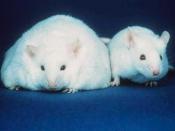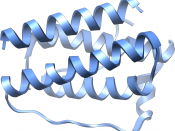Introduction
Food intake is an important determinant of both the rate of growth of animals and their body composition. Various hormones, gastric distension, and other factors affect the central nervous system to regulate food intake. In addition, several environmental cues, such as food availability, are factors of consumption as well. Ensuring that signals are functioning properly is necessary to have adequate nutrition and reduce the debilitating diseases and conditions associated with over consumption of food.
A hormone of significant research in food intake regulation is leptin. Plasma levels of leptin rise and fall in parallel with body fat content - as body fat mass increases, so does the concentration of leptin in blood. Injection of leptin leads to reduction in body weight by suppressing food intake and increasing metabolic rate and energy expenditure. Understanding leptin and its major role in the body is needed to properly understand how consumption of nutrients is controlled.
The objective is to review research of leptin function in animals and humans and to critically examine its role in regulating food intake.
Leptin
In order to efficiently match energy intake to energy expenditure and maintain energy stores, the hypothalamic centers regulating energy balance needs to monitor the amount of energy stored in the adipose tissue. Leptin is a hormone secreted by the adipose tissue that provides this information to the central nervous system. Leptin is a protein synthesized from the LEP gene, previously term ob gene (Larsson et al., 1998). Leptin functions as a satiety signal that acts in the brain to regulate food intake and ultimately to control body fat mass.
Leptin and food intake in obese and normal mice
The LEP gene has been found to direct the synthesis of leptin in adipose tissue. Obesity in ob/ob mice develops from a mutation resulting in...


